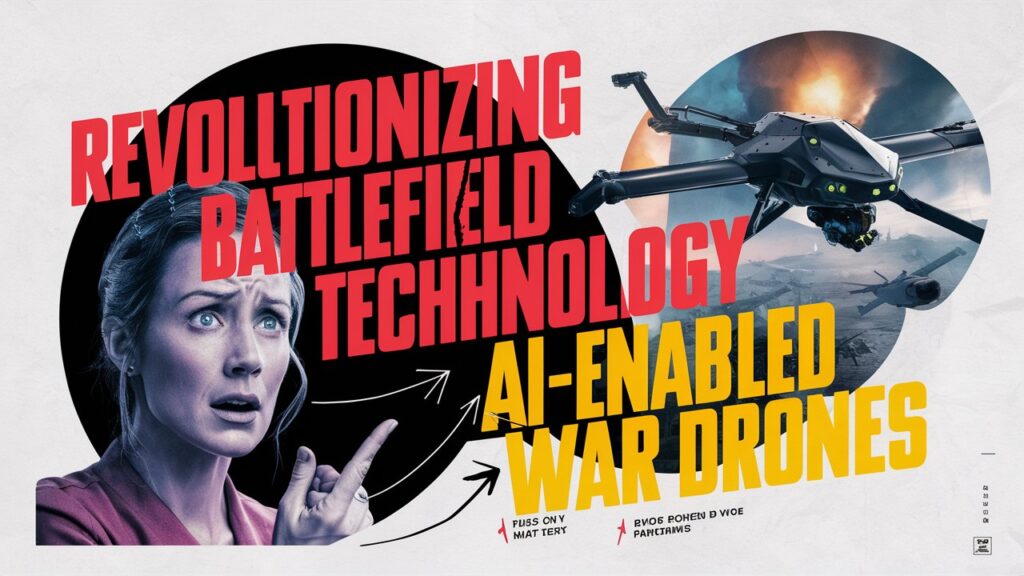Ukraine’s AI-Enabled Drones: A Game-Changer in Warfare
Ukraine is revolutionizing its defense capabilities with cutting-edge AI-driven drone technology, presenting a formidable challenge to Russian electronic warfare.
Ukraine Develops AI-Enabled Drones
Ukraine is rapidly developing AI-enabled drones to counter electronic interference tactics commonly used by Russia, enhancing their defensive capabilities.
Swarm Capabilities
These drones can operate in interconnected swarms, with AI enabling instant decisions and human oversight for strikes. The AI can process hundreds of drones, significantly scaling up operations.
Improving Battlefield Advantage
AI-enhanced drones offer improved target tracking, enhanced speed, and increased flight range, giving Ukraine a strategic edge in the conflict against Russia.
Cost and Scalability
Ukrainian developers aim to keep AI systems inexpensive, using low-cost computers like Raspberry Pi to deploy advanced technology en masse, ensuring widespread implementation.
AI-Enabled War Drones in Ukraine: Revolutionizing Battlefield Technology
In a groundbreaking development that’s reshaping modern warfare, Ukraine is at the forefront of creating artificial intelligence (AI) systems to operate a vast fleet of drones. This technological leap is not just a response to Russia’s signal jamming tactics; it’s a potential game-changer in military operations. Let’s explore the implications, benefits, and concerns surrounding this cutting-edge technology.
The Rise of AI-Enabled Drones in Ukraine
Ukraine’s rapid advancement in AI-controlled drones is a direct response to the challenges posed by Russia’s signal jamming techniques. These jamming efforts have significantly disrupted communication between drone pilots and their unmanned aerial vehicles (UAVs), reducing their effectiveness in combat scenarios.
Key Developments in AI Drone Technology
- Visual Systems for Target Identification: AI algorithms are being developed to accurately identify and classify potential targets.
- Terrain Mapping for Navigation: Advanced AI systems are creating detailed maps to enhance drone navigation capabilities.
- Swarming Capabilities: AI enables drones to operate in coordinated groups, executing complex maneuvers and missions.
- Signal Jamming Countermeasures: AI systems are designed to overcome signal disruptions, ensuring continuous operation even in hostile environments.
The Impact of AI on Drone Operations
The integration of AI into drone technology is set to revolutionize battlefield operations in several ways:
Scalability and Automation
One of the most significant advantages of AI-enabled drones is their ability to operate at scale. While human pilots can only manage a limited number of drones simultaneously, AI systems can potentially control hundreds of UAVs at once. This scalability opens up new possibilities for large-scale drone operations.
Enhanced Efficiency and Accuracy
AI-controlled drones have the potential to dramatically improve the efficiency and accuracy of military operations. With their ability to process vast amounts of data quickly and make split-second decisions, these drones could significantly increase the success rate of missions.
According to industry experts, AI-operated drones could potentially achieve an 80% hit rate, a substantial improvement over the current 30-50% rate for manned drones.
Protection of Human Operators
By reducing the need for direct human control, AI-enabled drones offer increased protection for drone pilots. These operators are often prime targets for enemy forces, and minimizing their exposure to danger is a crucial benefit of this technology.
Swarm Drones: The Future of Aerial Warfare
One of the most exciting developments in AI-enabled drone technology is the concept of swarm drones. Companies like Swarmer are at the forefront of this innovation, developing software that allows large groups of drones to operate as a cohesive unit.
Advantages of Swarm Drones
- Instant Decision-Making: Swarm drones can make collective decisions in real-time, adapting to changing battlefield conditions.
- Overwhelming Force: A swarm of drones can overwhelm enemy defenses through sheer numbers and coordinated attacks.
- Resilience: If individual drones in a swarm are lost or disabled, the overall mission can still continue.
Serhiy Kupriienko, CEO of Swarmer, emphasizes the importance of AI in managing drone swarms: “For a swarm of 10 or 20 drones or robots, it’s virtually impossible for humans to manage them. But AI would be able to process hundreds”.
The Ethical Dilemma of AI in Warfare

While the potential benefits of AI-enabled drones are significant, their development and deployment raise important ethical questions:
Concerns About Autonomous Decision-Making
The use of AI in warfare raises concerns about the lack of human judgment in critical situations. There are fears that AI systems might make decisions that violate international humanitarian law or lead to unintended consequences.
Samuel Bendett, Adjunct Senior Fellow at the Center for a New American Security, suggests that “AI drone control systems would likely need a human in the loop to prevent the system from making errors in target selection”.
Potential Violations of International Law
The autonomous nature of AI-controlled drones could potentially lead to actions that violate international humanitarian law. The lack of direct human oversight raises questions about accountability and the potential for war crimes.
The Future of Human Decision-Making in Warfare
As AI systems become more advanced, there are concerns about the diminishing role of human decision-making in military operations. This shift could have profound implications for the nature of warfare and international relations.
The Global Impact of AI-Enabled Drones
The development of AI-enabled drones in Ukraine is likely to have far-reaching consequences beyond the current conflict:
Shifting Balance of Power
The successful deployment of AI-controlled drones could potentially alter the balance of power in military conflicts. Nations with advanced AI capabilities may gain a significant advantage over those without.
Arms Race in AI Technology
The development of AI-enabled drones could spark a new arms race, with nations scrambling to develop and deploy increasingly sophisticated AI systems for military use.
Changing Nature of Warfare
As AI-enabled drones become more prevalent, the nature of warfare itself may change. Future conflicts could see swarms of autonomous drones engaging each other, with minimal human involvement.
The Road Ahead: Challenges and Opportunities
As Ukraine continues to develop its AI-enabled drone capabilities, several challenges and opportunities lie ahead:
Technical Challenges
- Signal Jamming Resilience: Developing AI systems that can effectively overcome signal jamming remains a key challenge.
- Swarm Coordination: Creating algorithms that can effectively coordinate large swarms of drones in complex environments is an ongoing area of research.
- AI Decision-Making: Improving the decision-making capabilities of AI systems to ensure they act in accordance with military objectives and international law.
Opportunities for Innovation
- Advancements in AI Technology: The development of AI-enabled drones is likely to drive significant advancements in AI technology, with potential applications beyond military use.
- Improved Battlefield Intelligence: AI-controlled drones could provide unprecedented levels of real-time battlefield intelligence, improving strategic decision-making.
- Reduced Military Casualties: By reducing the need for human soldiers in high-risk situations, AI-enabled drones could potentially reduce military casualties.
Conclusion: A New Era of Warfare
The development of AI-enabled war drones in Ukraine marks a significant milestone in the evolution of military technology. While these advancements offer potential benefits in terms of efficiency, accuracy, and protection of human life, they also raise important ethical and legal questions that must be addressed.
As we stand on the brink of this new era in warfare, it’s crucial that the international community engages in open dialogue about the implications of AI in military operations. The decisions made today will shape the future of global security and the nature of conflict for generations to come. With OpenAI’s latest AI advancements leading the charge in technological innovation, both military and civilian sectors must carefully consider the ethical and strategic consequences of integrating such systems into defense infrastructures. An emphasis on transparency, accountability, and international cooperation is essential to ensure that these powerful tools are used responsibly and for the greater good of humanity.
The rapid progress in AI-enabled drone technology in Ukraine serves as a wake-up call for the world. It’s a reminder that the future of warfare is here, and it’s powered by artificial intelligence. As we move forward, balancing technological advancement with ethical considerations will be key to ensuring that these powerful tools are used responsibly and in accordance with international law.
What are your thoughts on the development of AI-enabled war drones? How do you think this technology will impact the future of global security? Share your views in the comments below and join the conversation about this crucial topic.
AI-Enabled Drone Development in Ukraine
This chart illustrates the focus areas of AI-enabled drone development in Ukraine, showing the relative emphasis on different aspects of drone technology.







